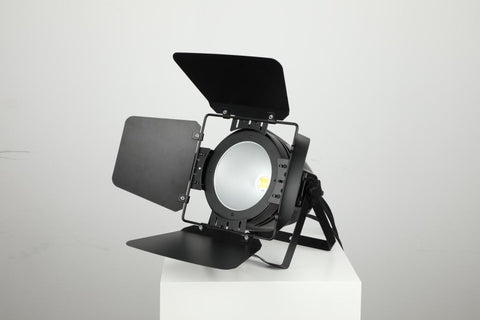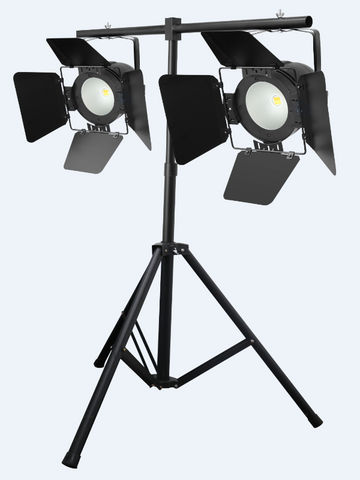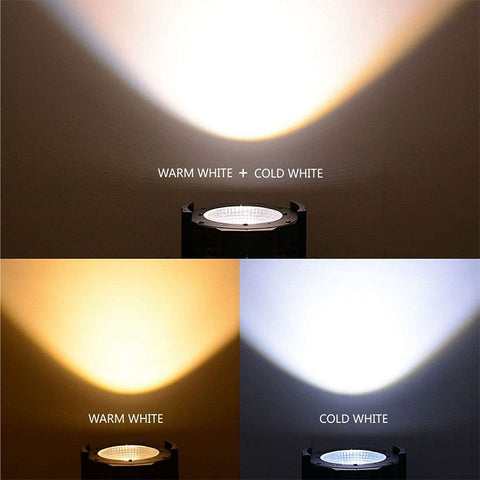パフォーマンスにおいて、期待通りの効果を実現するために、舞台照明は重要な役割を果たします。例えば、一般的に使用されているLED舞台照明は、RGイエロー、RBパープル、RGBホワイトなど、様々な色を表現できます。高輝度と省エネ特性を持つLED照明は、様々な分野で広く利用されています。では、舞台照明におけるパーライトの具体的な役割と効果とはどのようなものでしょうか?
ステージを照らして視認性を確保します。
パーライトは、高い光量とビームの制御性で知られています。光を集中させ、ステージ上の特定のエリアに照射することで、特定のシーンやパフォーマーを際立たせることができます。集中的かつ指向性のあるビームは観客の視線を誘導し、ステージの最も重要な部分へと注意を引き付けます。そのため、パーライトは単なる照明器具ではなく、舞台パフォーマンスに欠かせない存在となっています。精密な光制御によって、没入感のある視覚体験を生み出し、あらゆるパフォーマンスを鮮やかで魅惑的なものにします。

色彩と雰囲気の強化
LEDパーライトは、単なる視認性にとどまらず、芸術的表現の領域までその可能性を広げます。シームレスなカラーブレンディングにより、デザイナーは独自のカラーパレットを作り出し、特定の感情を呼び起こしたり、イベントのテーマを強調したりすることができます。これは、RGBミキシングテクノロジーによって実現され、LEDパーライトは最大1670万色の発光を実現します。静かなシーンを彩る落ち着いたブルーから、激しいアクションシーンを彩る鮮やかなレッドまで、LEDパーライトはあらゆるシーンに適応し、デザイナーに比類のない創造的な表現ツールを提供します。

LEDパーライトに関するよくある質問
LEDパーライトは、従来のパーライトに比べて多くの利点があります。最も大きな利点は、外部フィルターを必要とせずに多様な色を表現できることです。これにより、パフォーマンスの視覚効果が向上するだけでなく、カラーフィルターのメンテナンスや交換にかかる作業量とコストを削減できます。さらに、LEDライトは消費電力が少なく、寿命が長いため、コスト効率が高く、環境にも優しい製品です。
- LED パーライトのプログラミングはどのように行いますか?
パフォーマンスの前に、プロの照明技術者はLEDパーライトをプログラミングすることが非常に重要です。これは、パフォーマンスの振り付けに合わせて各ライトを制御するための照明コンソールの設定を含みます。技術者は、ライトが所定のパスに沿って点灯するように調整し、RGBの原理に基づいて色を混ぜ合わせます。このプログラミングにより、パフォーマンス中にライトが動的に変化し、あらゆるシーンの要件を満たすことが可能になります。
- LED パーライトはグレアの問題をどのように解決しますか?
ステージ照明において、グレアは大きな問題となることがあります。強い光は演者と観客の両方にとって不快感を与える可能性があるためです。これを軽減するために、LEDパーライトには光を柔らかくし、グレアを軽減するディフューザーやフィルターが装備されていることがよくあります。さらに、焦点調整機能を備えた器具もあり、必要に応じてビームを広げたり狭めたりすることで、光の強度をさらにコントロールできます。
LED パーライトは舞台照明の分野では欠かせないツールです。色の混合と輝度制御における柔軟性により、照明はパフォーマンスの視覚体験を飛躍的に向上させます。舞台裏では、献身的なデザイナーと技術者がこれらの機能を最大限に活用し、あらゆるパフォーマンスが見やすいだけでなく、視覚的にも素晴らしいものになるよう尽力しています。技術の進歩により、舞台芸術におけるクリエイティブな照明の可能性は新たな高みに達すると期待されています。
舞台照明に最適なソリューションをお探しなら、







コメントを残してください
全てのコメントは、掲載前にモデレートされます
このサイトはhCaptchaによって保護されており、hCaptchaプライバシーポリシーおよび利用規約が適用されます。